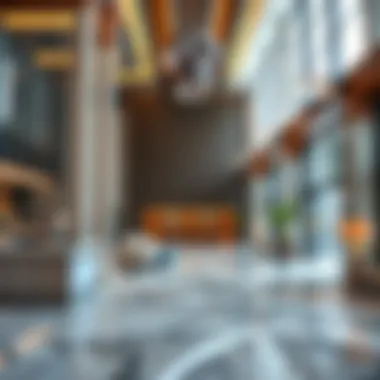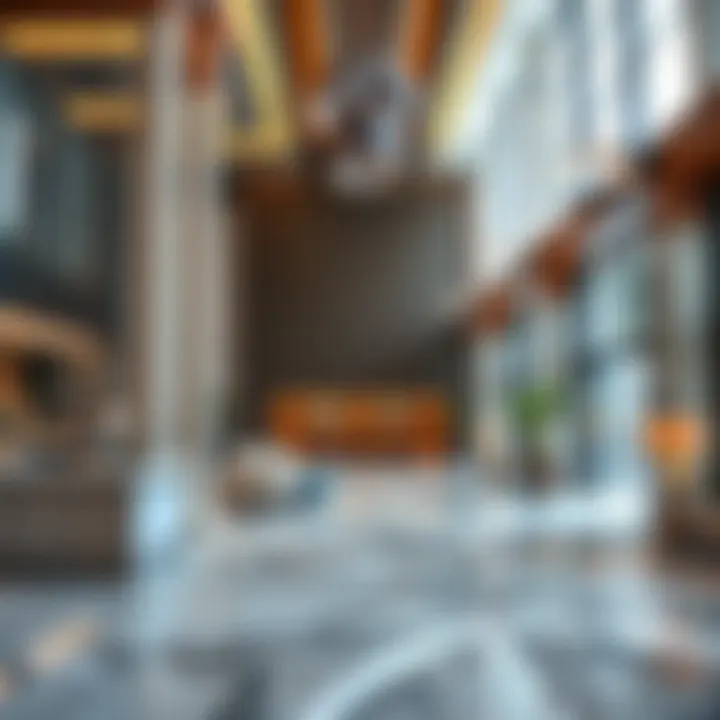Media City Hotels: Transforming Dubai's Real Estate Scene


Intro
Dubai's skyline, a testament to human ambition, stretches further and higher with each passing year. Nestled within this striking architecture lies Media City, a hub that has not only redefined the hospitality industry but also left a significant mark on the real estate landscape. The emergence of hotels in Media City has transformed its narrative, making it a sanctuary for tourists, professionals, and investors alike. Understanding the implications of these changes is crucial for anyone involved in the property market in this vibrant city.
Market Insights
The hotels in Media City are not mere accommodations; they are pivotal players in shaping market trends and behaviors. As locations that attract a blend of business and leisure travelers, these venues have spurred growth not just in tourism, but in the real estate market as well.
Current Market Trends
The synergy between hospitality and real estate is evident in the uptick of development projects in and around Media City. Various hotels are not solely focused on offering stays, but also curated experiences that appeal to a diverse clientele, including expats, business professionals, and tourists seeking the Dubai experience. As a result, the demand for nearby residential properties has seen a noticeable rise.
Such developments imply an interconnectedness where hotels drive not just visitor numbers but also investment interest in luxury apartments and commercial spaces nearby. Furthermore, the rise of remote work has prompted an increase in long-term stays, a trend that further fuels investment in residential spaces in the vicinity.
Price Analysis and Forecasts
As for pricing, areas closely associated with these hotels have witnessed a significant price appreciation. For instance, a two-bedroom apartment that once sold for AED 1.5 million is now fetching around AED 2 million due to the increased foot traffic and the amenities that hotels inject into the area.
Real Estate analysts predict that this trend will continue, especially as recent hotels open their doors and more businesses set up shop in Media City. The expectation is that there will be a steady incremental increase in property values, making this a golden period for investors looking to dip their toes in the Dubai market.
“In the last five years, Media City’s real estate sector has seen an influx of both local and foreign investment, shaping its landscape significantly.”
Investment Opportunities
The implications of hotels in Media City extend far beyond their immediate environment; they present various opportunities for savvy investors. With demand continuing to rise, identifying prime locations within this precinct is essential.
Top Areas for Real Estate Investment
Investors should look closely at neighborhoods like Dubai Marina and Jumeirah Beach Residence. These locations are not only desirable for tourist influx but also hold strong appeal for those working in Media City. Properties situated within a stone’s throw of these hotels are likely to appreciate in value as they cater to the needs of transient professionals and long-term tenants alike.
ROI and Yield Calculations
When considering purchasing property, understanding the return on investment (ROI) is key. Investors focusing on rental yields in these areas can expect robust returns, often exceeding 8% in good conditions. Comfortably furnished, hotel-adjacent apartments typically rent for around AED 120,000 annually, providing property owners a reliable revenue stream.
Understanding Media City Hotels
Exploring the concept of Media City hotels reveals much more than just a collection of lodging facilities in Dubai. It embodies a significant shift in how urban spaces can integrate hospitality, commerce, and culture. Media City goes beyond being a mere physical location; it symbolizes a vision for the future of urban development tailored to a digital age. The hotels in this district provide essential services and act as catalysts for economic growth and social interactions, shaping the real estate landscape in profound ways.
In this article, we'll look into the vital components of Media City hotels. Understanding these establishments is crucial for various stakeholders, including investors, home buyers, and real estate agents. Here are some of the key aspects we will dive into:
- Economic contributions: Media City hotels boost local economies, offer job opportunities, and attract investment.
- Cultural exchange: They serve as venues for international events, promoting cultural engagement.
- Innovation and trends: The evolution of these hotels reflects the changing landscape of consumer preferences and technological advancements.
Through this lens, we’ll dissect different aspects of these hotels—defining what constitutes Media City, understanding the core concept of these hotels, and examining their historical development. Each of these elements contributes uniquely to the growing real estate market in Dubai, making this examination both timely and relevant.
Defining Media City
Media City, officially known as Dubai Media City, is a free zone that is vital to the Emirate's goal of fostering a thriving media industry. Established in 2001, it has rapidly become home to numerous local and international media companies, ranging from publishing firms to digital media entities. Its strategic location and business-friendly environment have attracted a wide array of stakeholders.
Properties in Media City are not just designed for rent or sale; they punctuate the urban fabric with a focus on creativity and innovation. Consequently, Media City epitomizes a contrasting environment to traditional residential or commercial real estate, as its core ethos encourages collaboration, knowledge transfer, and a networked economy based on the media industry.
Unsurprisingly, this burgeoning community has necessitated a variety of accommodation options, leading to the proliferation of Media City hotels that cater not only to tourists but also to professionals seeking temporary lodging amid their business engagements.
The Concept of Media City Hotels
Media City hotels are not your average hospitality establishments; they serve multiple purposes and meet diverse needs. These venues range from luxurious accommodations to functional spaces that provide amenities tailored for business travelers, such as high-speed internet and conference rooms. The concept revolves around fostering a unique blend of leisure and productivity, aiming to keep leisure guests and business professionals comfortable.
The hotels have aimed to create an ecosystem where visitors can easily access key business hubs while also enjoying the vibrancy of Dubai’s culture. By offering tailored experiences, such as specialized recreational facilities and customizing dining options, these hotels add value to the Media City experience.
In essence, Media City hotels are designed to reflect the innovative spirit of Dubai. They cater to the cosmopolitan lifestyle of the guests, emphasizing both comfort and the convenience that a business traveler would expect.
Historical Context and Development
The development of Media City hotels is intricately linked with the growth of the media sector in Dubai. Initially, it was imperative to create an environment conducive to media and communications enterprises. As the media landscape evolved, in tandem with the local and global economy, so did the demand for hosting facilities. The first hotels began to sprout up as early as 2003, aiming to support the influx of agencies, corporations, and freelancers.


Over the years, this sector has been shaped by various trends and events, including the rise of digital media. As corporations sought a base in Media City, hotels responded by expanding their offerings to accommodate the influx of new visitors.
"The success of Media City can be observed through the lens of its hotel industry; one enhances the other, creating a powerful symbiotic relationship in the realm of real estate."
This historical interplay highlights the importance of these hotels not just as resting places but as integral parts of a broader ecosystem influencing Dubai’s real estate narrative. The sector has continually adapted to meet the demands of an increasingly interconnected world, paving the way for future developments in hotel concepts and offerings.
Key Features of Media City Hotels
Understanding the key features of Media City hotels is essential for grasping their role in shaping Dubai's real estate landscape. These hotels are not merely places to stay, but they serve as essential nodes within the burgeoning hospitality sector. The significance of amenities, architectural design, and sustainability initiatives cannot be overstated, as they directly influence the attractiveness of the region for investors, tourists, and residents alike.
Amenities and Services Offered
Amenities and services at Media City hotels set the stage for a unique experience that caters to a diverse clientele. They not only enhance guest satisfaction but also have a profound impact on the overall perception of Dubai's hospitality industry.
Business Centers
The business centers situated within Media City hotels are a game-changer for corporate travelers and businesses alike. These spaces are equipped with state-of-the-art technology, including high-speed internet, video conferencing facilities, and private meeting rooms. What makes these centers particularly appealing is their capability to provide a professional environment away from home, which is invaluable for both short-term visitors and long-term residents. A striking feature is their adaptability; they often feature flexible workspaces that can be tailored to the specific needs of guests. This adaptability proves to be a beneficial aspect for businesses, allowing them to conduct meetings seamlessly and efficiently.
Leisure Facilities
Leisure facilities at Media City hotels also play a critical role in the overall experience for guests. These facilities often encompass swimming pools, gyms, and wellness spa services designed for relaxation and rejuvenation. The appeal of having access to such amenities during a stay cannot be overlooked, especially when Dubai is known for its luxurious lifestyle. Unique features like rooftop pools with stunning city views or yoga sessions at dawn can significantly enhance a guest's experience. However, it’s essential to consider that the quality and maintenance of these facilities can vary widely among different hotels, impacting guest satisfaction.
Dining Options
When it comes to dining options, Media City hotels offer an array of culinary experiences that reflect Dubai’s multicultural tapestry. From fine dining establishments to casual eateries, the variety of food and drink choices cater to every palate. A key characteristic is the integration of both local and international cuisines, allowing guests to indulge in culinary delights from around the world. One standout feature is the use of locally sourced ingredients, which not only emphasizes sustainability but also supports the regional economy. However, guests may find that some dining establishments within hotels can be on the pricier side, which might deter budget-conscious travelers.
Architectural Significance
The architectural significance of Media City hotels goes beyond mere aesthetics; it is a reflection of Dubai’s ambition and innovation. The design of these hotels often incorporates modern aesthetics fused with cultural elements, showcasing local artistry and contemporary architecture. Such designs create not only functional spaces but also visually appealing landmarks that contribute to the skyline of Dubai. This architectural diversity attracts tourists and serves as a testament to the city's commitment to building a world-class destination.
Sustainability Initiatives
Sustainability initiatives within Media City hotels are becoming increasingly vital as the world places a greater emphasis on ecological responsibility. Many hotels are implementing practices such as energy-efficient systems, water conservation measures, and green building designs. For instance, some hotels incorporate solar panels, while others focus on waste reduction techniques and the use of eco-friendly materials in their construction. These initiatives not only aim to minimize the environmental impact but also resonate with a growing demographic of eco-conscious travelers. However, the challenge remains in balancing luxury with sustainability without compromising the guest experience.
Economic Impact of Media City Hotels
The economic footprint of Media City hotels extends far beyond their walls and guest lists. These establishments generate significant local revenue streams, while also playing a pivotal role in integrating Dubai's hospitality sector with the broader real estate landscape. As such, understanding their economic impact is essential for stakeholders, whether they are investors aiming to capitalize on growth or home buyers considering the long-term implications of their purchases.
Job Creation and Employment Opportunities
One of the most immediate effects of the Media City hotels is job creation. These hotels employ a vast range of individuals, from management positions to service roles. The demand for skilled workers, particularly in hospitality management, culinary arts, and customer service, enhances the local job market.
- Diverse Roles Available: The spectrum of jobs available ranges from chefs and waitstaff to event coordinators and IT support. This diversity nurtures a workforce that is both dynamic and multifaceted.
- Training and Development: Many hotels invest in staff training programs, enhancing skills and providing career development opportunities. This focus on training not only boosts employee retention but also elevates the service standards in Dubai’s hospitality sector.
In sum, the jobs created by Media City hotels bolster the local economy and contribute to sustainable employment growth in the region.
Contribution to the Local Economy
The contribution of Media City hotels to the local economy can be viewed through various lenses. First off, these hotels attract both leisure and corporate travelers, resulting in substantial spending on lodging, dining, and entertainment. As these visitors explore the city, they also contribute to the retail and service industries.
- Multiplier Effect: The spending by hotel guests has a multiplier effect on the local economy. For instance, guests dining at hotel restaurants are likely to explore nearby markets and attractions, thus circulating money throughout various local businesses.
- Tax Revenue: These hotels also serve as a source of tax revenue, which can be reinvested into local infrastructure and community programs.
The economic impact of Media City hotels creates a thriving ecosystem, benefiting not just the hotels themselves but the entire community.
Visitor Statistics and Trends
To fully appreciate the implications of Media City hotels, it is essential to examine visitor statistics and trends. According to recent data, Dubai continues to be a prime destination for tourists and business travelers alike. The influx of visitors is crucial for many sectors:
- Annual Growth Rates: Reports indicate a steady annual growth in visitors to Media City, reinforcing its status as a top destination.
- Demographic Insights: Understanding the demographics of these visitors, their preferences, and spending habits allows hotel management to tailor their offerings accordingly. For instance, younger travelers might be more interested in nightlife and tech-driven experiences, while families may prefer experiential packages.
"The ability to adapt to shifting trends in visitor behavior is critical for the ongoing success of Media City hotels."
Market Dynamics and Challenges


Understanding the market dynamics and challenges connected to Media City hotels is crucial for a comprehensive analysis of their impact on Dubai's real estate landscape. This segment sheds light on how various forces in the hospitality industry interact with these hotels, what challenges they face, and how these issues could shape investment opportunities and future growth.
Competition with Other Hospitality Segments
In the bustling world of Dubai's tourism and hospitality scene, Media City hotels find themselves in a complex environment laden with competition from various sectors. Large resorts, boutique hotels, and even budget accommodations create a dynamics where each segment tries to cater to specific customer profiles. It’s not simply about providing beds; it’s about offering an experience that can't be found just anywhere.
Media City hotels, with their focus on business travelers and corporate clientele, often compete with luxury hotels like the Burj Al Arab and international chains such as the Hilton. Unlike these colossal players that offer extensive amenities and attractions, Media City hotels aim for niche markets, such as tech and media professionals attending conferences or events. While they can’t always outshine the more luxurious properties in terms of glitz, they can win over guests through exceptional service and convenience, primarily due to their strategic locations near media hubs and business districts.
However, the landscape is shifting. The rise of alternate accommodations, like vacation rentals listed on platforms such as Airbnb, presents another layer of competition. Travelers often look for localized experiences and homes that offer a more personal touch. This evolution necessitates that Media City hotels stay keenly aware of trends and innovate constantly.
Market Saturation Concerns
As the number of hotels in Dubai continues to surge, the specter of market saturation looms large over the Media City segment. The hotel market here, with its rapid expansion over the past decade, raises questions about sustainability and profitability. With countless options, consumers can afford to be picky; therefore, hotels must ensure they are consistently attractive to avoid being lost in the crowd.
Factors contributing to this saturation include the increase of hotel supply due to aggressive development strategies, and the volatile nature of tourism, being subject to global events like pandemics or economic downturns. If too many hotels open up without a corresponding increase in demand, occupancy rates could drop, forcing prices down and ultimately affecting profit margins. This situation grows particularly worrisome for investors and developers who may have already committed significant resources based on forecasts that now appear too ambitious.
Strategies that the Media City segment could employ involve diversifying their offerings to include more tailored experiences that speak directly to targeted demographics or enhancing partnerships with tech companies or event organizers to create unique value propositions. That way, they may carve out distinct niches despite overall market trends.
Regulatory and Compliance Issues
Navigating the regulatory landscape in Dubai can be a complex affair, especially for hospitality players like Media City hotels. Compliance with local laws and regulations is not merely a matter of ticking boxes but understanding the legal framework that governs operations.
From construction regulations and zoning laws to licensing requirements, any misstep can lead to costly setbacks. Media City hotels must be diligent about adhering to these regulations, balancing the desire for innovation with the necessity of compliance. Moreover, the local government often revisits these regulations, which could affect operational capabilities or future developments in the hospitality sector.
Additionally, there are growing calls for hotels to adopt sustainable practices. Regulations around environmental impact are beginning to tighten, pushing hotels to rethink their energy consumption, waste management, and community engagement strategies. Surviving in this environment may require proactive approaches to compliance, ensuring not only the hotel’s legitimacy but also its reputation as a responsible member of the business community.
Investor Insights
Investors play a pivotal role in shaping the future of any city, and Dubai is certainly no exception. With its robust economy and increasing focus on tourism and hospitality, Media City hotels represent a unique aspect of the real estate landscape that prospective investors should closely regard. Understanding the attraction of these hotels is crucial not only for identifying profitable opportunities but also for comprehending the broader implications on Dubai's real estate market.
One of the primary elements to consider when discussing Investor Insights is the investment potential surrounding Media City hotels. The strategic location in the heart of Dubai, coupled with a diverse array of amenities and services, makes these hotels a prime investment target. Investors can benefit from the rising tourist numbers, business events, and cultural festivals that drive demand. Furthermore, the alignment with Dubai's vision as a global city ensures ongoing momentum in the locale's growth.
Investment Potential in Media City Hotels
The attractiveness of Media City hotels lies not only in the immediate income generated by room bookings but also in the long-term appreciation of property value. Hotels located in this vibrant sector are more than just places to stay; they are interconnected with the broader Dubai ecosystem, engaging with various sectors such as technology, media, and arts.
Several key factors contribute to the investment potential:
- High occupancy rates: Media City enjoys steady demand from international guests, which translates into high occupancy levels for hotels.
- Diverse clientele: The range of businesses situated in Media City helps ensure regular patronage from corporate clients and leisure travelers alike, providing investors with a reliable customer base.
- Development incentives: The Dubai government consistently supports development projects, offering new opportunities for hotel expansion and renovation.
Investing in Media City hotels can yield substantial returns, but it requires careful consideration and analysis of the market trends and consumer behavior.
Case Studies of Successful Investments
Turning our gaze towards real-world examples, there are numerous success stories that could serve as a reference for new and existing investors.
A notable case is the Hilton Dubai Jumeirah, which marked a significant turning point in Media City’s hospitality landscape. After its launch, the hotel not only attracted tourists but also established itself as a key venue for business conferences and events, leading to consistent annual revenues far exceeding initial forecasts. As the hotel’s reputation grew, it capitalized on Dubai's burgeoning tourism sector, showcasing the considerable benefits that can arise from well-placed investments in strategic locations.
Another illustration can be seen in the Radisson Blu Hotel, which focuses on sustainability and innovation. Their success stems from tailored branding efforts that resonate with eco-conscious travelers. Substantial investment in energy-efficient technologies not only enhances guest experiences but also meets the growing demand for sustainable tourism, allowing the hotel to stand out in a crowded market.
Future Projections for Growth
What lies ahead for Media City hotels? Several indicators suggest a bright future, particularly as global travel resumes and expands once more.
- Increased global connectivity: Direct flights and improved transport links from various parts of the world continue to bolster the region's appeal for international tourists.
- Emergence of new business hubs: As the media and tech sectors expand, more businesses will seek accommodations near Media City, prompting growth in the hospitality sector.
- Integration of technology: The adoption of AI and IoT in hotel operations is reshaping guest experiences, influencing future investment decisions.
As investors look to capitalise on these trends, it is imperative to remain adaptable and responsive to the evolving landscape.
In essence, Media City hotels hold a blend of rich investment potential and promise for sustained growth, making it an essential focus area for investors looking to navigate Dubai's real estate intricacies effectively.
Future Trends in Media City Hotels
The hotel landscape in Media City is morphing swiftly due to evolving consumer expectations and technological disruptions. Understanding these trends is not merely academic; for investors and stakeholders, it provides a roadmap to navigate future investments and operations.


Adapting to Changing Consumer Preferences
As the market grows, so do the demands of modern travelers. Today's guests prioritize personalized experiences, wellness options, and sustainable practices over the once-coveted extravagance. For instance, many visitors are keen on locally themed packages that give a taste of Dubai's rich heritage. Hotels that incorporate local art and cuisine into their offerings create not only a more memorable stay but also promote the cultural essence of the city.
The rise of millennial and Gen Z travelers, who are known for their conscious consumption, has resulted in a shift towards eco-friendly practices. Increasingly, guests are looking for hotels that support sustainability initiatives, whether it be through greener amenities or responsible sourcing of materials. Offering transparent waste management systems or collaborating with local charities can enhance a hotel’s appeal in this demographic.
In a nutshell, adapting to these preferences isn’t just a trend; it’s a necessity. Hotels must remain agile, ready to pivot when consumer patterns shift, effectively creating a cycle of feedback and improvement.
Technological Innovations Shaping Hospitality
Technology is at the forefront of transforming the hospitality experience. The integration of artificial intelligence in customer service is becoming more prevalent — think automated check-ins and chatbots managing inquiries at all hours. This trend allows hotels to streamline operations, providing guests with faster, more efficient service while reducing waiting times.
Moreover, the rise of smart rooms is revolutionizing how guests interact with their environments. Devices like smart speakers can control lighting or temperature, tailor entertainment options, and even offer local recommendations with simple voice commands. As more hotels invest in such innovations, it’s clear that enhancing guest comfort and convenience through tech will likely become standard practice.
Additionally, the incorporation of virtual and augmented reality into marketing strategies allows potential guests to experience hotel offerings before they arrive. With immersive visuals appealing to tech-savvy travelers, these methods can increase booking rates by providing more engaging previews of accommodations.
Integration of Smart Design Elements
Today's hotel designs are increasingly focusing on functionality blended with aesthetic appeal. Smart design principles involve not only the layout of a property but also how each space facilitates sustainability and guest interaction. We can see this is coming to life in Media City hotels that are embracing biophilic design — using natural elements like plants and natural light to enhance the guest experience while improving indoor air quality.
Moreover, multi-purpose spaces are gaining traction. Lobbies and lounges are transitioning from simple waiting areas to vibrant hubs for social interaction or work, offering more than just a waiting spot. Thoughtfully placed seating arrangements, instant connectivity, and flexible layouts empower guests to choose how they want to use these spaces.
Ultimately, the integration of smart design elements ensures that hotels cater to a diverse range of needs, both for leisure and business travelers, reinforcing their place in a dynamic market.
Cultural Significance of Media City Hotels
Media City hotels are more than just places for travelers to rest their heads for the night. They hold a pivotal role in shaping Dubai's cultural narrative and enhancing local engagement. They reflect the cultural fabric of Dubai and serve as important facilitators of artistic expression, innovation, and tourism. As more creatives and professionals flock to this region, Media City hotels become a microcosm of the diverse influences that grace the city, offering spaces where local culture can thrive alongside international flair.
Role in Promoting Local Culture
These hotels often integrate local cultural elements into their design and services. Authentic Arabian hospitality isn't merely a catchphrase; it encompasses the warmth and generosity that characterize Emirati traditions. Visitors experience this first-hand through culinary offerings, local artwork, and themed events that reflect Dubai's heritage. When a hotel hosts art exhibits featuring Emirati artists or offers traditional meals, it promotes and preserves local culture in ways that resonate with both tourists and residents.
As these establishments look to capture the essence of Dubai, they ensure that elements like music and art from the region are not just present but celebrated. For instance, the Ritz-Carlton Dubai often features local musicians during special events, turning the hotel into a cultural hub that enhances the city's artistic landscape.
Hospitality and Cultural Engagement
Hotels in Media City aren't just about offering a bed for the night; they engage guests in cultural experiences that enrich their stay. Activities such as cooking classes, local crafts workshops, and guided tours of nearby cultural sites are integral to enhancing the visitor experience. These engagements not only provide entertainment but also a deeper understanding of Dubai's multifaceted society.
A noteworthy example is the Sheraton Grand Hotel, which hosts regular workshops in Arabic calligraphy. Guests are offered a chance to learn about this intricate art form, blending their hotel experience with genuine cultural learning. This hands-on approach creates a sense of belonging and connection to the local community for visitors, one that standard hotels often overlook.
Events and Festivals Hosted
The Media City hotels play a vital role in hosting a variety of events that reflect the region’s cultural landscape. From art festivals to culinary showcases, these venues become stages where both established and emerging talents can shine. Major events like the Dubai International Film Festival or the Gulf Food Expo leverage these hotels as central hubs, accommodating international participants and audiences while promoting cultural exchange.
Moreover, during the month of Ramadan, hotels across Media City organize Iftar events, opening their doors to people from different backgrounds, promoting unity, understanding, and inclusivity.
"The real heart of a city lies in its ability to bring people together, and Media City hotels do just that."
End and Recommendations
In the grand tapestry of Dubai's evolving real estate environment, the role of Media City hotels is more than just a footnote. It is a vibrant thread that interweaves various aspects of the hospitality sector and the city’s broader economic fabric. Media City hotels have proven not only to attract a global clientele but also to influence investment trends, tourism, and the local economy, marking them as integral components to this city’s identity.
As this analysis draws to a close, it’s evident that several key implications arise from the rapid expansion and growing significance of these hotels. Here, we can highlight a few critical elements that stakeholders should keep in mind:
- Economic Boost: Media City hotels have undeniably contributed to the local economy, creating job opportunities and fostering a myriad of sectors—from food and beverage to technology and events management.
- Tourism Synergy: With events and exhibitions hosted so frequently, these hotels not only offer lodging but they also create experiences that cater to both leisure and business travelers, bridging various markets effectively.
- Real Estate Dynamics: The introduction and continuous development of Media City hotels influence property values in the surrounding areas. Investors keen on capitalizing on the area's growth must acknowledge how these establishments affect their real estate portfolios.
- Sustainability Appeal: With an increasing consumer demand for eco-friendly initiatives, Media City hotels are embracing greener practices, reflecting a cultural shift that aligns with global trends. This can be both a marketing strategy and a sound business decision.
- Future Innovations: The hotels' integration of advanced technologies highlights a trend towards modernization, indicating how essential it is to stay abreast of new trends that can enhance guest experiences, from artificial intelligence to smart room designs.
Summarizing Key Takeaways
In wrapping up the discussion around Media City hotels, we can outline some key takeaways that encapsulate the findings:
- Interconnectivity: Hotels serve not only as lodging but as venues for events that propel local economies.
- Investment Potential: The real estate environment surrounding Media City is influenced significantly by these hotels, making them pivotal points for potential investment.
- Cultural Integration: This segment of hospitality plays an essential role in showcasing Dubai's culture, contributing to the city’s global image.
- Environmentally Conscious: Sustainability isn’t just a trend; it's a necessity that Media City hotels are beginning to embrace.
- Technological Advances: Staying in tune with the latest technologies ensures these establishments remain competitive and cater to evolving consumer preferences.
Strategic Recommendations for Stakeholders
For all stakeholders involved—be it investors, real estate agents, or developers—embracing these insights is crucial. Below are strategic recommendations aimed at maximizing the benefits from Media City hotels:
- Conduct Detailed Market Analysis: Stay informed about consumer trends and behaviors within the hospitality sector, as these can provide valuable insights for investment.
- Align with Sustainable Initiatives: As consumers are becoming more environmentally conscious, finding alignment with sustainability practices can enhance brand loyalty and attract clientele.
- Invest in Technology: Emphasize investment in technology that enhances guest experiences, ensures operational efficiency, and improves service delivery.
- Focus on Unique Offerings: Differentiate from competitors by offering unique experiences or specialized services to attract niche markets, like business travelers seeking proximity to Media City’s corporate hubs.
- Foster Partnerships: Collaboration with local businesses can enhance services and create packages that cater to tourists, bringing in added revenue streams that benefit all parties.
In the complex world of Dubai's real estate, understanding the nuances presented by Media City hotels can present untapped opportunities for those willing to engage with this ever-evolving landscape.











